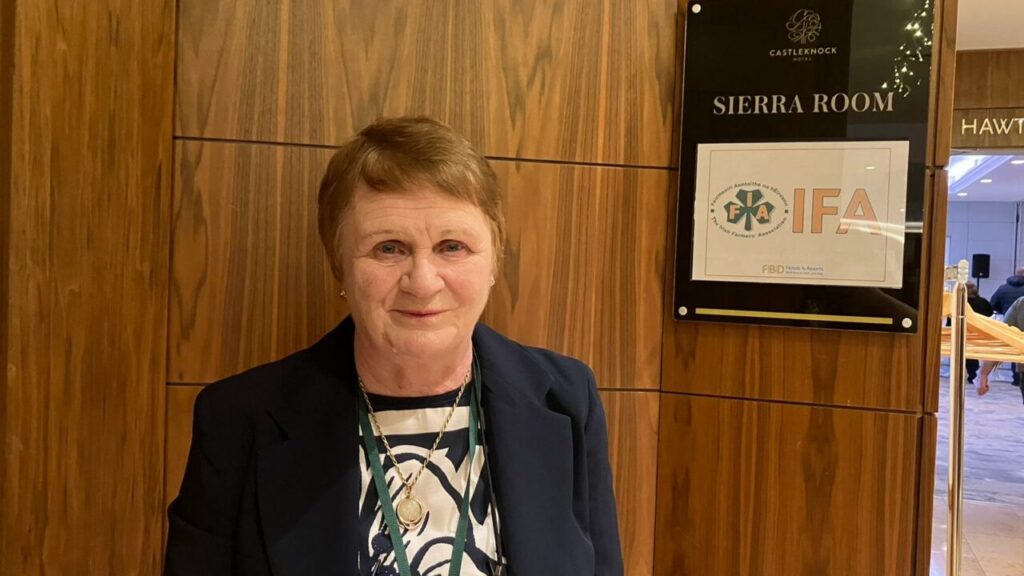IFA Deputy President, Wexford’s Alice Doyle has called out the need for Department of Agriculture Food and the Marine to deliver on deadlines and commitments made to farmers.
She was speaking following a meeting with senior Department of Agriculture officials in Johnstown Castle last week, which focused predominantly on the persistent challenges with ACRES and TAMS.
“There needs to be better engagement and dialogue with farmers. The Department has to be more solutions-focused and not simply explaining their way out of it,” she said.
Farmers can understand some teething issues in the first year of any scheme, but what has transpired with ACRES, and to a lesser extent TAMS, simply isn’t good enough.
“When we hear of the administrative headache involved with ACRES, with up to 42 or 43 checks before payment, there has to be a simpler way. We need to learn from the lessons of the past year and ensure they aren’t repeated,” she said.
IFA Hill Farming Chair Caillin Conneely said farmers in ACRES Co-Operation were sold a pup. It’s very disappointing and farmers are losing faith fast. Average payment in Year 1 was only €5,100 – well below half what was promised, and to rub salt in the wounds the mechanisms to improve scores/payments for future years (i.e. Non-Productive Investments / Landscape Actions) aren’t even on the pitch yet, almost three years into a five-year scheme.
“The Department and CP Teams have serious questions to answer here, on the low scoring; the lack of consultation; and the impact of including a 100m buffer around turbary activity; and why NPI/LA aren’t yet functioning.”
“We got assurances and commitments from DAFM that the ACRES CP Teams have meetings lined up in the coming weeks. I’d encourage farmers to engage and attend these meetings to get clarity on current standings and what can be done to increase payments in the years to come,” he said.
“NPI approvals will commence end of this year, and a second window will open for NPI applications in mid-September,” he said.
IFA Rural Development chair John Curran said on the balancing payments and recoupment of funds, we got strong assurances from the DAFM that 95% of outstanding ACRES balancing payments will be paid by end September, and that systems and resources are in place to ensure the maximum number of advance ACRES payments will start to issue end-November without impact.
The DAFM is also considering the extension of the catch crop deadline beyond September 15th given the harvest challenges and delays.
About seven thousand farmers were over-paid on the interim payments received, averaging €1,741, with over a thousand having repaid already or have agreed repayment arrangements in place. That still leaves a good few that will have payments automatically deducted from the ANC payment mid-September if they don’t act sooner rather than later.
“Any farmer that needs to make interim payments should talk to the Department today, or certainly before the end of the week, so they can avail of the maximum options available, including repaying when suits without causing further cashflow pressure on-farm. For those with deductions/arrangements in place, we also got assurances that the recoupment of interim payments will in no way impact the timing of ANC payments mid-September,” he said.
IFA Environment chair John Murphy said after a rocky start, TAMS appears to be more back on track.
Close on 90% of Year 1 applications have been approved and payments are flowing for all schemes, with the exception of the Women Capital Investment Scheme which is funded under the CAP Strategic Plan and supposedly has additional functionality and reporting requirements. We got assurances that payments under the Women Capital Investment Scheme will commence by end September, that the overall TAMS budget isn’t an issue in the short-term; and that with a return to more traditional three- month tranches and systems in tune, valid applications should receive decisions within a month of closing.
“This has to be delivered upon, particularly for the nutrient storage/management type investments. Given time constraints and the need to preserve and improve water quality, the whole TAMS process surrounding nutrient storage applications needs to be expedited; applications exempt from any rank/selection; and reference costs & ceilings updated to better account for inflationary pressures. We got assurances that this can be done, and that reference costs would be reviewed next year,” he said.
Many lower stocked and smaller-scale farmers will need to use LESS from Jan 1st, yet the Department is grant-aiding the Trailing Shoe only, discounting the dribble bar.
“If it costs less, suits more farmers, and is safer for many, while delivering emission reductions, then it should qualify. It’s only logical, and we will continue to lobby on,” he said.

